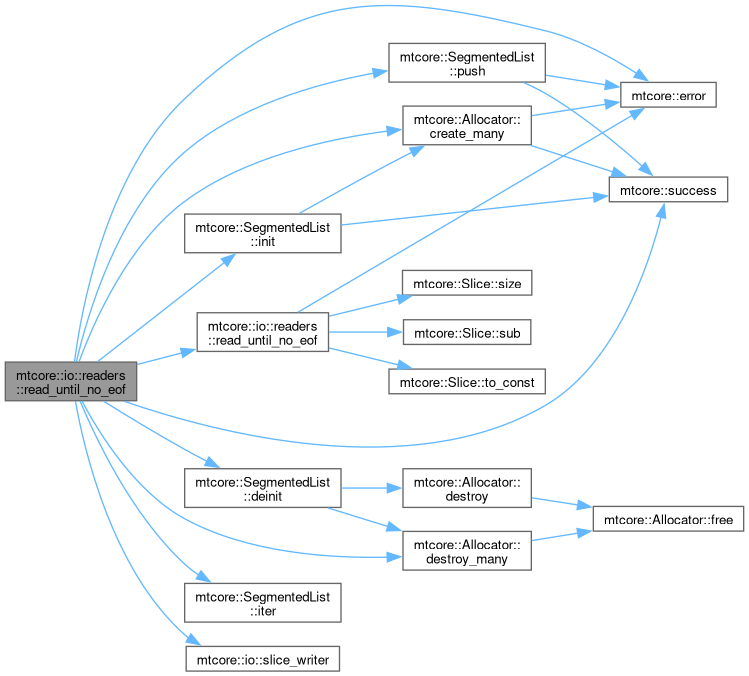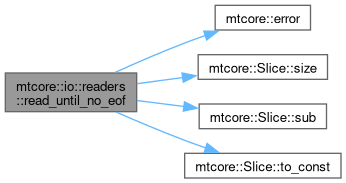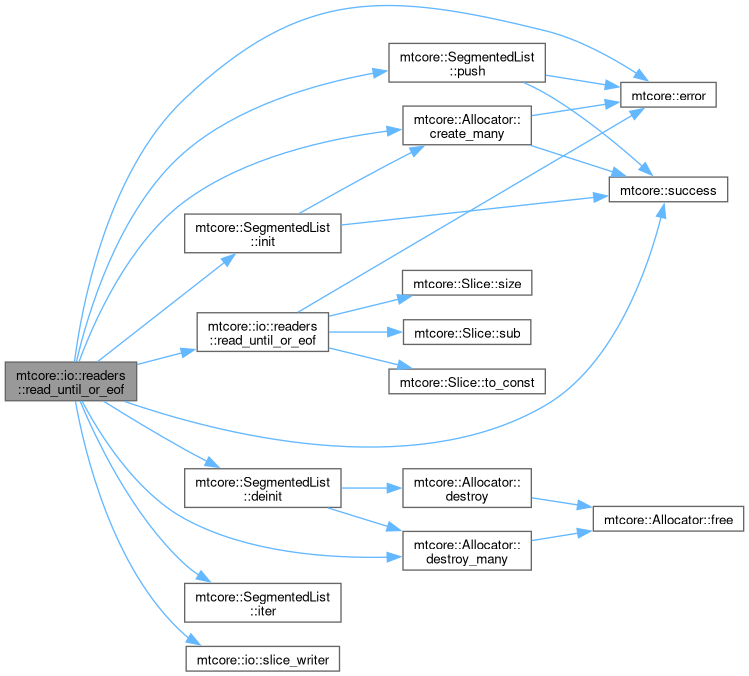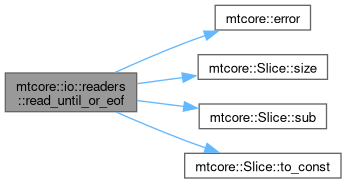Methods and coroutines related to readers abstractions. More...
Namespaces | |
| namespace | mtcore::io::readers |
| Additional algorithms that can be done on a reader without having to extend the reader type We're encouraging this method of extending readers to avoid readers from becoming incredibly large, and to create a standardized extension mechanism to allow 3rd party extensions of readers. | |
Classes | |
| struct | mtcore::io::Reader< Impl > |
| A reader that reads data from some sort of stream or buffer Note: the data elements read should be trivially constructible, trivially destructible, and trivially copyable. More... | |
Functions | |
| template<typename T> | |
| Result< typename Reader< T >::ResSlice, typename Reader< T >::ErrType > | mtcore::io::readers::read_until_or_eof (Reader< T > &self, typename Reader< T >::BuffSlice buff, const std::remove_const_t< typename Reader< T >::ReadElem > &delim) |
| Reads data from a reader into a Slice up until there is either a delimiter or end of file If the buffer is not big enough, the error SIZE_EXCEEDED will be returned. | |
| template<typename T> | |
| Result< typename Reader< T >::BuffSlice, typename Reader< T >::ErrType > | mtcore::io::readers::read_until_or_eof (Reader< T > &self, Allocator &alloc, const std::remove_const_t< typename Reader< T >::ReadElem > &delim, size_t maxSize=std::numeric_limits< size_t >::max()) |
| Reads data from a reader into an allocated Slice up until there is either a delimiter or end of file If the buffer is not big enough, the error SIZE_EXCEEDED will be returned Will return a Slice that the caller MUST clean up with alloc.destroy_many() Will try to shrink internal buffer before returning. | |
| template<typename T> | |
| Result< typename Reader< T >::ResSlice, typename Reader< T >::ErrType > | mtcore::io::readers::read_until_no_eof (Reader< T > &self, typename Reader< T >::BuffSlice buff, const std::remove_const_t< typename Reader< T >::ReadElem > &delim) |
| Reads data from a reader into a Slice up until there is either a delimiter If the buffer is not big enough, the error SIZE_EXCEEDED will be returned If the end of file is reached, the error END_OF_FILE will be returned. | |
| template<typename T> | |
| Result< typename Reader< T >::BuffSlice, typename Reader< T >::ErrType > | mtcore::io::readers::read_until_no_eof (Reader< T > &self, Allocator &alloc, const std::remove_const_t< typename Reader< T >::ReadElem > &delim, size_t maxSize=std::numeric_limits< size_t >::max()) |
| Reads data from a reader into an allocated Slice up until there is either a delimiter If the buffer is not big enough, the error SIZE_EXCEEDED will be returned If the end of file is reached, the error END_OF_FILE will be returned Will return a Slice that the caller MUST clean up with alloc.destroy_many() Will try to shrink internal buffer before returning. | |
| template<typename T> | |
| Reader< impl::SliceReaderImpl< T > > | mtcore::io::slice_reader (Slice< T > buff) |
| Creates a reader to read the contents of a Slice. | |
Detailed Description
Methods and coroutines related to readers abstractions.
Function Documentation
◆ read_until_no_eof() [1/2]
| Result< typename Reader< T >::BuffSlice, typename Reader< T >::ErrType > mtcore::io::readers::read_until_no_eof | ( | Reader< T > & | self, |
| Allocator & | alloc, | ||
| const std::remove_const_t< typename Reader< T >::ReadElem > & | delim, | ||
| size_t | maxSize = std::numeric_limits<size_t>::max() ) |
Reads data from a reader into an allocated Slice up until there is either a delimiter If the buffer is not big enough, the error SIZE_EXCEEDED will be returned If the end of file is reached, the error END_OF_FILE will be returned Will return a Slice that the caller MUST clean up with alloc.destroy_many() Will try to shrink internal buffer before returning.
- Template Parameters
-
T Type of data being read
- Parameters
-
self Reader to operate on alloc Allocator to use to create buffer delim Delimiter to read until maxSize Maximum size of data to be read (anything >100MB will get smaller allocations)
- Returns
- Result of data read, or error
Definition at line 500 of file reader.hpp.

◆ read_until_no_eof() [2/2]
| Result< typename Reader< T >::ResSlice, typename Reader< T >::ErrType > mtcore::io::readers::read_until_no_eof | ( | Reader< T > & | self, |
| typename Reader< T >::BuffSlice | buff, | ||
| const std::remove_const_t< typename Reader< T >::ReadElem > & | delim ) |
Reads data from a reader into a Slice up until there is either a delimiter If the buffer is not big enough, the error SIZE_EXCEEDED will be returned If the end of file is reached, the error END_OF_FILE will be returned.
- Template Parameters
-
T Type of data being read
- Parameters
-
self Reader to operate on buff Buff to write read data to delim Delimiter to read until
- Returns
- Result of data read, or error
Definition at line 457 of file reader.hpp.


◆ read_until_or_eof() [1/2]
| Result< typename Reader< T >::BuffSlice, typename Reader< T >::ErrType > mtcore::io::readers::read_until_or_eof | ( | Reader< T > & | self, |
| Allocator & | alloc, | ||
| const std::remove_const_t< typename Reader< T >::ReadElem > & | delim, | ||
| size_t | maxSize = std::numeric_limits<size_t>::max() ) |
Reads data from a reader into an allocated Slice up until there is either a delimiter or end of file If the buffer is not big enough, the error SIZE_EXCEEDED will be returned Will return a Slice that the caller MUST clean up with alloc.destroy_many() Will try to shrink internal buffer before returning.
- Template Parameters
-
T Type of data being read
- Parameters
-
self Reader to operate on alloc Allocator to use to create buffer delim Delimiter to read until maxSize Maximum size of data to be read (anything >100MB will get smaller allocations)
- Returns
- Result of data read, or error
Definition at line 342 of file reader.hpp.

◆ read_until_or_eof() [2/2]
| Result< typename Reader< T >::ResSlice, typename Reader< T >::ErrType > mtcore::io::readers::read_until_or_eof | ( | Reader< T > & | self, |
| typename Reader< T >::BuffSlice | buff, | ||
| const std::remove_const_t< typename Reader< T >::ReadElem > & | delim ) |
Reads data from a reader into a Slice up until there is either a delimiter or end of file If the buffer is not big enough, the error SIZE_EXCEEDED will be returned.
- Template Parameters
-
T Type of data being read
- Parameters
-
self Reader to operate on buff Buff to write read data to delim Delimiter to read until
- Returns
- Result of data read, or error
Definition at line 297 of file reader.hpp.


◆ slice_reader()
| Reader< impl::SliceReaderImpl< T > > mtcore::io::slice_reader | ( | Slice< T > | buff | ) |
Creates a reader to read the contents of a Slice.
- Template Parameters
-
T Data type to read (should be trivially copyable, constructible, and destructible)
- Parameters
-
buff Buffer to read from
- Returns
- A reader that reads from the Slice buffer
Definition at line 646 of file reader.hpp.